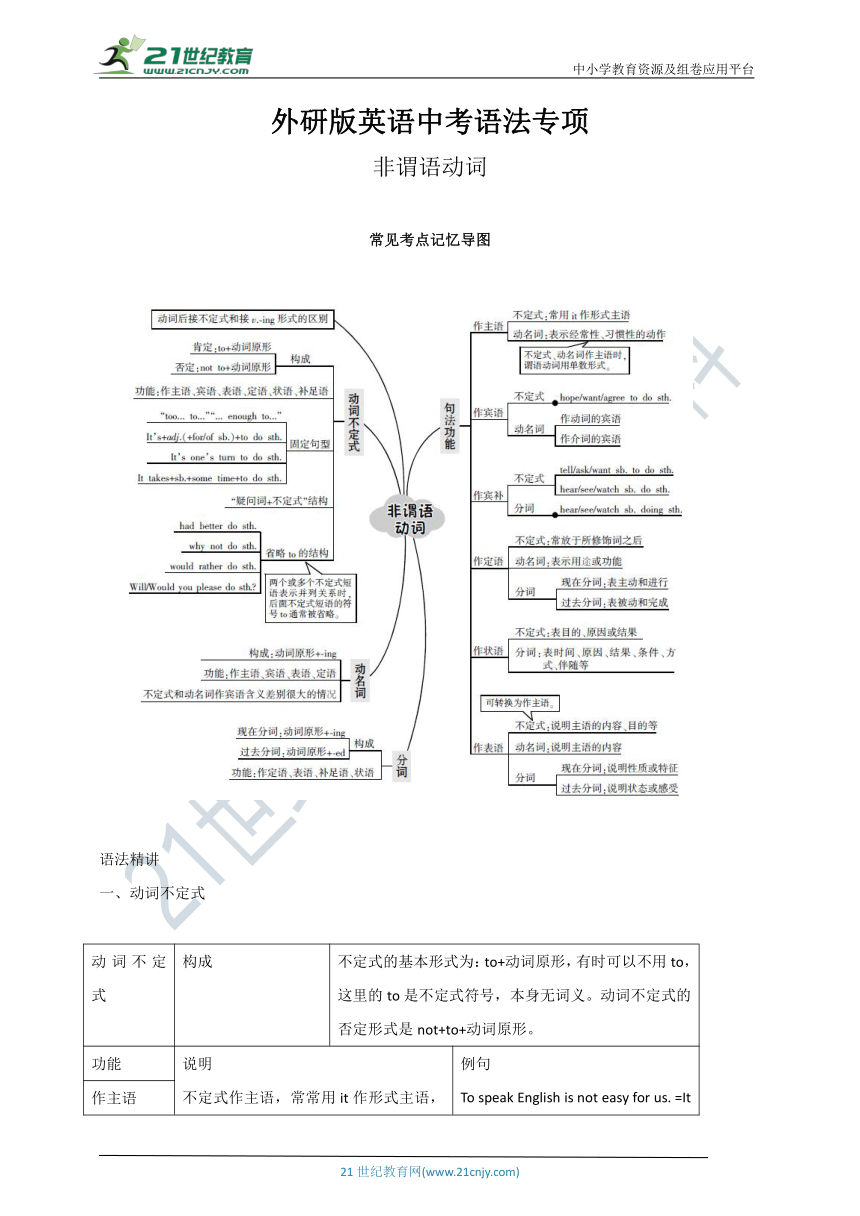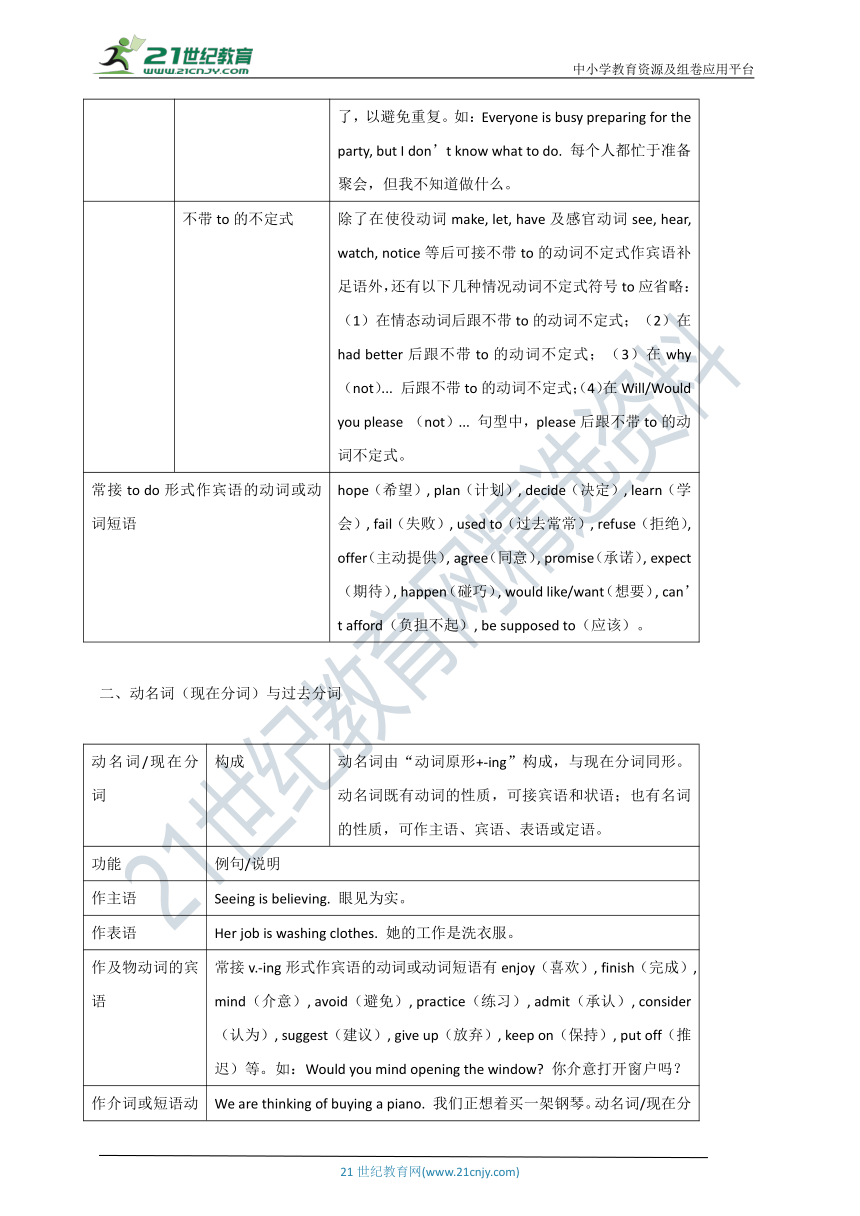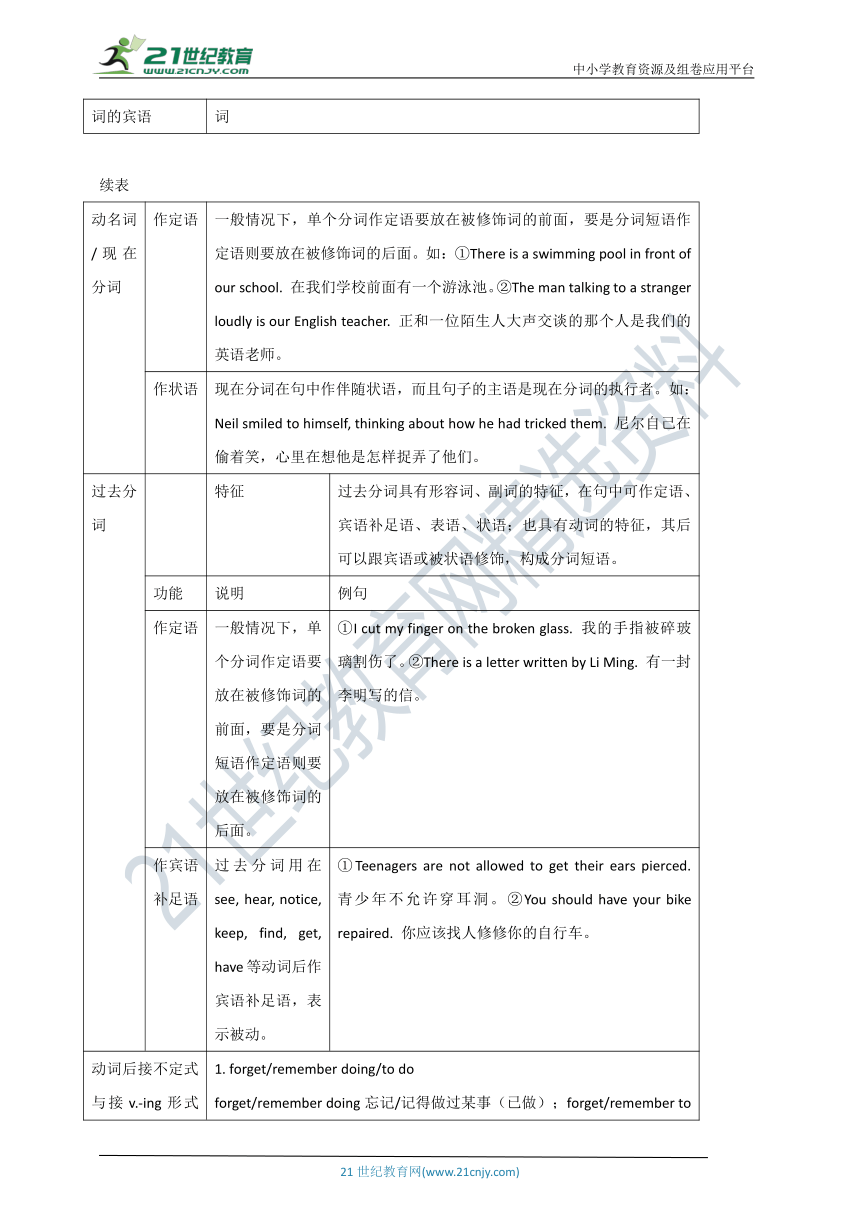外研版英语中考语法专项——非谓语动词 知识梳理+实战演练(含答案)
文档属性
| 名称 | 外研版英语中考语法专项——非谓语动词 知识梳理+实战演练(含答案) |

|
|
| 格式 | doc | ||
| 文件大小 | 1.5MB | ||
| 资源类型 | 试卷 | ||
| 版本资源 | 外研版 | ||
| 科目 | 英语 | ||
| 更新时间 | 2022-02-08 21:07:30 | ||
图片预览




文档简介
中小学教育资源及组卷应用平台
外研版英语中考语法专项
非谓语动词
常见考点记忆导图
语法精讲
一、动词不定式
动词不定式 构成 不定式的基本形式为:to+动词原形,有时可以不用to,这里的to是不定式符号,本身无词义。动词不定式的否定形式是not+to+动词原形。
功能 说明不定式作主语,常常用it作形式主语,而把不定式放在后面。 例句To speak English is not easy for us. =It is not easy for us to speak English. 讲英语对我们来说不容易。
作主语
动词不定式 功能 说明 例句
作表语 多数情况下,不定式作表语,可转换为作主语。 My work is to clean the room every day. =To clean the room every day is my work. 我的工作就是每天打扫这个房间。
作宾语 只能作某些动词的宾语,一般不作介词的宾语。 —What sports does he like to play 他喜欢做什么运动?—He likes to play basketball. 他喜欢打篮球。
作宾补 在make, let, see, hear, watch等使役、感官动词后,不定式省略to。 The boss makes his workers work all day. 老板让他的员工整天工作。
作定语 不定式作定语,要放在所修饰词的后面。 Do you have anything to say 你有什么要说的吗?
作状语 不定式作状语,其逻辑主语要和句子的主语一致。 ①I’m sorry to trouble you. 很抱歉,给你添麻烦了。(表原因)②I went to the library to study English. 我去图书馆学英语了。(表目的)
动词不定式与疑问词的连用 动词不定式常可以和what, where, when, how, which等疑问词连用,在句中充当某个成分。注:(1)动词不定式和疑问副词连用时如果该不定式是由及物动词构成的,则该不定式应带有宾语。如:The computer needs repairing. I don’t know how to repair it. 这个电脑需要修理。我不懂怎样修理它。(2)动词不定式和疑问代词连用时,如果该疑问代词就是该动词不定式的逻辑宾语,则在不定式中的动词后不可再用代词作其宾语了,以避免重复。如:Everyone is busy preparing for the party, but I don’t know what to do. 每个人都忙于准备聚会,但我不知道做什么。
不带to的不定式 除了在使役动词make, let, have及感官动词see, hear, watch, notice等后可接不带to的动词不定式作宾语补足语外,还有以下几种情况动词不定式符号to应省略:(1)在情态动词后跟不带to的动词不定式;(2)在had better后跟不带to的动词不定式;(3)在why (not)... 后跟不带to的动词不定式;(4)在Will/Would you please (not)... 句型中,please后跟不带to的动词不定式。
常接to do形式作宾语的动词或动词短语 hope(希望), plan(计划), decide(决定), learn(学会), fail(失败), used to(过去常常), refuse(拒绝), offer(主动提供), agree(同意), promise(承诺), expect(期待), happen(碰巧), would like/want(想要), can’t afford(负担不起), be supposed to(应该)。
二、动名词(现在分词)与过去分词
动名词/现在分词 构成 动名词由“动词原形+-ing”构成,与现在分词同形。动名词既有动词的性质,可接宾语和状语;也有名词的性质,可作主语、宾语、表语或定语。
功能 例句/说明
作主语 Seeing is believing. 眼见为实。
作表语 Her job is washing clothes. 她的工作是洗衣服。
作及物动词的宾语 常接v.-ing形式作宾语的动词或动词短语有enjoy(喜欢), finish(完成), mind(介意), avoid(避免), practice(练习), admit(承认), consider(认为), suggest(建议), give up(放弃), keep on(保持), put off(推迟)等。如:Would you mind opening the window 你介意打开窗户吗?
作介词或短语动词的宾语 We are thinking of buying a piano. 我们正想着买一架钢琴。动名词/现在分词
续表
动名词/现在分词 作定语 一般情况下,单个分词作定语要放在被修饰词的前面,要是分词短语作定语则要放在被修饰词的后面。如:①There is a swimming pool in front of our school. 在我们学校前面有一个游泳池。②The man talking to a stranger loudly is our English teacher. 正和一位陌生人大声交谈的那个人是我们的英语老师。
作状语 现在分词在句中作伴随状语,而且句子的主语是现在分词的执行者。如:Neil smiled to himself, thinking about how he had tricked them. 尼尔自己在偷着笑,心里在想他是怎样捉弄了他们。
过去分词 特征 过去分词具有形容词、副词的特征,在句中可作定语、宾语补足语、表语、状语;也具有动词的特征,其后可以跟宾语或被状语修饰,构成分词短语。
功能 说明 例句
作定语 一般情况下,单个分词作定语要放在被修饰词的前面,要是分词短语作定语则要放在被修饰词的后面。 ①I cut my finger on the broken glass. 我的手指被碎玻璃割伤了。②There is a letter written by Li Ming. 有一封李明写的信。
作宾语补足语 过去分词用在see, hear, notice, keep, find, get, have等动词后作宾语补足语,表示被动。 ①Teenagers are not allowed to get their ears pierced. 青少年不允许穿耳洞。②You should have your bike repaired. 你应该找人修修你的自行车。
动词后接不定式与接v.-ing形式的区别 1. forget/remember doing/to doforget/remember doing忘记/记得做过某事(已做);forget/remember to do忘了/记得要做某事(未做)。如:①The light in the office is still on. He forgot to turn it off. 办公室的灯还亮着。他忘记关了。(没关灯)②He forgot turning the light off. 他忘记他已经关灯了。(已关灯)③Don’t forget to buy some food for your mother tomorrow. 明天别忘了给你妈妈买些食品。2. stop doing/to dostop doing停止做某事;stop to do停止、中断做某事后去做另一件事。如:①They stopped to smoke cigarettes. 他们停下来去抽烟。②I must stop smoking. 我必须戒烟了。3. regret doing/to doregret doing对做过的事遗憾、后悔(已做);regret to do对要做的事遗憾(未做)。如:①I regret to have to do this, but I have no choice. 我很遗憾必须这样去做,但我实在没有办法。②I don’t regret telling her what I thought. 我不为告诉她我的想法而后悔。4. 感官动词+doing/do常见的感官动词有see, watch, observe, notice, look at, hear, listen to, smell, taste。“感官动词+do”表示动作的完整性、真实性;“感官动词+doing”表示动作的连续性、进行性。如:①I saw him work in the garden yesterday. 昨天我看见他在花园里干活了。(强调“我看见他在干活”这一整个动作)②I saw him working in the garden yesterday. 昨天我看见他正在花园里干活。(强调“我看见他正在干活”这个动作)
实战演练
用所给动词的适当形式填空
A组
1. (衢州中考)I promise______________ (keep) the secret.
2. (杭州中考)These days it is difficult______________ (imagine) a world without books.
3. —Why haven’t you left school, Bob
—I’m waiting for my father______________ (take) me home.
4. I found it very hard______________ (arrive) on time because of the heavy rain.
5. He used______________ on the right in China, but he soon got used______________ on the left in England. (drive)
6. I will show you the photos______________ (take) in Thailand by the time they come out.
7. —What should I do, doctor
—______________(keep) healthy, you should take more exercise.
8. Many students said that they were willing to work hard to make their dreams______________
(come) true.
9. Mr. Wang does what he can______________ (help) us improve our English.
10. The school will hold many activities____________ (celebrate) our country’s 70th birthday.
B组
11. The girl could visit the sick kids in the hospital______________(cheer) them up.
12. They have decided______________ (join) the English club.
13. Why not______________ (stop) working and have a rest
14. The boy was made______________ (study) for twelve hours a day without resting.
15. Could you please not______________ (wear) jeans to school It’s against the school rule.
16. Remember______________ (post) the letter for me on your way to school.
17. I remember_________ (meet) all of you when you were just starting Grade 7 at this school.
18. Tom, you should have your hair______________ (cut) this evening. It’s too long.
19. It’s important______________ (get) on well with your classmates at school.
20. I’m considering______________ (buy) a new car this year.
参考答案
第33课 非谓语动词
实战演练
1. to keep 2. to imagine 3. to take 4. to arrive
5. to drive, to driving 6. taken 7. To keep
8. come 【解析】make后跟不带to的动词不定式作宾语补足语。
9. to help 【解析】根据句意“王老师做他能够做的来帮助我们提高英语”可知应该用动词不定式作目的状语。
10. to celebrate 11. to cheer 12. to join 13. stop
14. to study 15. wear 16. to post 17. meeting 18. cut
19. to get 20. buying
21世纪教育网 www.21cnjy.com 精品试卷·第 2 页 (共 2 页)
HYPERLINK "http://21世纪教育网(www.21cnjy.com)
" 21世纪教育网(www.21cnjy.com)
外研版英语中考语法专项
非谓语动词
常见考点记忆导图
语法精讲
一、动词不定式
动词不定式 构成 不定式的基本形式为:to+动词原形,有时可以不用to,这里的to是不定式符号,本身无词义。动词不定式的否定形式是not+to+动词原形。
功能 说明不定式作主语,常常用it作形式主语,而把不定式放在后面。 例句To speak English is not easy for us. =It is not easy for us to speak English. 讲英语对我们来说不容易。
作主语
动词不定式 功能 说明 例句
作表语 多数情况下,不定式作表语,可转换为作主语。 My work is to clean the room every day. =To clean the room every day is my work. 我的工作就是每天打扫这个房间。
作宾语 只能作某些动词的宾语,一般不作介词的宾语。 —What sports does he like to play 他喜欢做什么运动?—He likes to play basketball. 他喜欢打篮球。
作宾补 在make, let, see, hear, watch等使役、感官动词后,不定式省略to。 The boss makes his workers work all day. 老板让他的员工整天工作。
作定语 不定式作定语,要放在所修饰词的后面。 Do you have anything to say 你有什么要说的吗?
作状语 不定式作状语,其逻辑主语要和句子的主语一致。 ①I’m sorry to trouble you. 很抱歉,给你添麻烦了。(表原因)②I went to the library to study English. 我去图书馆学英语了。(表目的)
动词不定式与疑问词的连用 动词不定式常可以和what, where, when, how, which等疑问词连用,在句中充当某个成分。注:(1)动词不定式和疑问副词连用时如果该不定式是由及物动词构成的,则该不定式应带有宾语。如:The computer needs repairing. I don’t know how to repair it. 这个电脑需要修理。我不懂怎样修理它。(2)动词不定式和疑问代词连用时,如果该疑问代词就是该动词不定式的逻辑宾语,则在不定式中的动词后不可再用代词作其宾语了,以避免重复。如:Everyone is busy preparing for the party, but I don’t know what to do. 每个人都忙于准备聚会,但我不知道做什么。
不带to的不定式 除了在使役动词make, let, have及感官动词see, hear, watch, notice等后可接不带to的动词不定式作宾语补足语外,还有以下几种情况动词不定式符号to应省略:(1)在情态动词后跟不带to的动词不定式;(2)在had better后跟不带to的动词不定式;(3)在why (not)... 后跟不带to的动词不定式;(4)在Will/Would you please (not)... 句型中,please后跟不带to的动词不定式。
常接to do形式作宾语的动词或动词短语 hope(希望), plan(计划), decide(决定), learn(学会), fail(失败), used to(过去常常), refuse(拒绝), offer(主动提供), agree(同意), promise(承诺), expect(期待), happen(碰巧), would like/want(想要), can’t afford(负担不起), be supposed to(应该)。
二、动名词(现在分词)与过去分词
动名词/现在分词 构成 动名词由“动词原形+-ing”构成,与现在分词同形。动名词既有动词的性质,可接宾语和状语;也有名词的性质,可作主语、宾语、表语或定语。
功能 例句/说明
作主语 Seeing is believing. 眼见为实。
作表语 Her job is washing clothes. 她的工作是洗衣服。
作及物动词的宾语 常接v.-ing形式作宾语的动词或动词短语有enjoy(喜欢), finish(完成), mind(介意), avoid(避免), practice(练习), admit(承认), consider(认为), suggest(建议), give up(放弃), keep on(保持), put off(推迟)等。如:Would you mind opening the window 你介意打开窗户吗?
作介词或短语动词的宾语 We are thinking of buying a piano. 我们正想着买一架钢琴。动名词/现在分词
续表
动名词/现在分词 作定语 一般情况下,单个分词作定语要放在被修饰词的前面,要是分词短语作定语则要放在被修饰词的后面。如:①There is a swimming pool in front of our school. 在我们学校前面有一个游泳池。②The man talking to a stranger loudly is our English teacher. 正和一位陌生人大声交谈的那个人是我们的英语老师。
作状语 现在分词在句中作伴随状语,而且句子的主语是现在分词的执行者。如:Neil smiled to himself, thinking about how he had tricked them. 尼尔自己在偷着笑,心里在想他是怎样捉弄了他们。
过去分词 特征 过去分词具有形容词、副词的特征,在句中可作定语、宾语补足语、表语、状语;也具有动词的特征,其后可以跟宾语或被状语修饰,构成分词短语。
功能 说明 例句
作定语 一般情况下,单个分词作定语要放在被修饰词的前面,要是分词短语作定语则要放在被修饰词的后面。 ①I cut my finger on the broken glass. 我的手指被碎玻璃割伤了。②There is a letter written by Li Ming. 有一封李明写的信。
作宾语补足语 过去分词用在see, hear, notice, keep, find, get, have等动词后作宾语补足语,表示被动。 ①Teenagers are not allowed to get their ears pierced. 青少年不允许穿耳洞。②You should have your bike repaired. 你应该找人修修你的自行车。
动词后接不定式与接v.-ing形式的区别 1. forget/remember doing/to doforget/remember doing忘记/记得做过某事(已做);forget/remember to do忘了/记得要做某事(未做)。如:①The light in the office is still on. He forgot to turn it off. 办公室的灯还亮着。他忘记关了。(没关灯)②He forgot turning the light off. 他忘记他已经关灯了。(已关灯)③Don’t forget to buy some food for your mother tomorrow. 明天别忘了给你妈妈买些食品。2. stop doing/to dostop doing停止做某事;stop to do停止、中断做某事后去做另一件事。如:①They stopped to smoke cigarettes. 他们停下来去抽烟。②I must stop smoking. 我必须戒烟了。3. regret doing/to doregret doing对做过的事遗憾、后悔(已做);regret to do对要做的事遗憾(未做)。如:①I regret to have to do this, but I have no choice. 我很遗憾必须这样去做,但我实在没有办法。②I don’t regret telling her what I thought. 我不为告诉她我的想法而后悔。4. 感官动词+doing/do常见的感官动词有see, watch, observe, notice, look at, hear, listen to, smell, taste。“感官动词+do”表示动作的完整性、真实性;“感官动词+doing”表示动作的连续性、进行性。如:①I saw him work in the garden yesterday. 昨天我看见他在花园里干活了。(强调“我看见他在干活”这一整个动作)②I saw him working in the garden yesterday. 昨天我看见他正在花园里干活。(强调“我看见他正在干活”这个动作)
实战演练
用所给动词的适当形式填空
A组
1. (衢州中考)I promise______________ (keep) the secret.
2. (杭州中考)These days it is difficult______________ (imagine) a world without books.
3. —Why haven’t you left school, Bob
—I’m waiting for my father______________ (take) me home.
4. I found it very hard______________ (arrive) on time because of the heavy rain.
5. He used______________ on the right in China, but he soon got used______________ on the left in England. (drive)
6. I will show you the photos______________ (take) in Thailand by the time they come out.
7. —What should I do, doctor
—______________(keep) healthy, you should take more exercise.
8. Many students said that they were willing to work hard to make their dreams______________
(come) true.
9. Mr. Wang does what he can______________ (help) us improve our English.
10. The school will hold many activities____________ (celebrate) our country’s 70th birthday.
B组
11. The girl could visit the sick kids in the hospital______________(cheer) them up.
12. They have decided______________ (join) the English club.
13. Why not______________ (stop) working and have a rest
14. The boy was made______________ (study) for twelve hours a day without resting.
15. Could you please not______________ (wear) jeans to school It’s against the school rule.
16. Remember______________ (post) the letter for me on your way to school.
17. I remember_________ (meet) all of you when you were just starting Grade 7 at this school.
18. Tom, you should have your hair______________ (cut) this evening. It’s too long.
19. It’s important______________ (get) on well with your classmates at school.
20. I’m considering______________ (buy) a new car this year.
参考答案
第33课 非谓语动词
实战演练
1. to keep 2. to imagine 3. to take 4. to arrive
5. to drive, to driving 6. taken 7. To keep
8. come 【解析】make后跟不带to的动词不定式作宾语补足语。
9. to help 【解析】根据句意“王老师做他能够做的来帮助我们提高英语”可知应该用动词不定式作目的状语。
10. to celebrate 11. to cheer 12. to join 13. stop
14. to study 15. wear 16. to post 17. meeting 18. cut
19. to get 20. buying
21世纪教育网 www.21cnjy.com 精品试卷·第 2 页 (共 2 页)
HYPERLINK "http://21世纪教育网(www.21cnjy.com)
" 21世纪教育网(www.21cnjy.com)
同课章节目录
- 词法
- 名词
- 动词和动词短语
- 动词语态
- 动词时态
- 助动词和情态动词
- 非谓语动词
- 冠词
- 代词
- 数词和量词
- 形容词副词及其比较等级
- 介词和介词短语
- 连词和感叹词
- 构词法
- 相似、相近词比较
- 句法
- 陈述句
- 一般疑问句和否定疑问句
- 特殊疑问句及选择疑问句
- 反意疑问句
- 存在句(There be句型)
- 宾语从句
- 定语从句
- 状语从句
- 主谓一致问题
- 简单句
- 并列句
- 复合句
- 主谓一致
- 主、表语从句
- 名词性从句
- 直接引语和间接引语
- 虚拟语气
- 感叹句
- 强调句
- 倒装句
- 祈使句
- 句子的成分
- 句子的分类
- 题型专区
- 单项选择部分
- 易错题
- 完形填空
- 阅读理解
- 词汇练习
- 听说训练
- 句型转换
- 补全对话
- 短文改错
- 翻译
- 书面表达
- 任务型阅读
- 语法填空
- 其他资料
